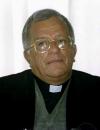Issue Date: June 6, 2003
By MARGARET HEBBLETHWAITE English speakers were noteworthy for their absence at the meeting of the Latin American bishops’ council in May. The council, known by its Spanish acronym, CELAM, held its regular four-year assembly here, just outside Asunción. Among those invited were two U.S. bishops: Bishop Wilton Gregory, president of the United States Conference of Catholic Bishops, and Bishop Edmond Carmody, president of the U.S. Secretariat for the Church in Latin America. Neither turned up, and nor did Bishop Jacques Berthelet, president of the Canadian Conference of Catholic Bishops. It was a pity, because up till now the bishops of North and South America have responded positively to the challenge implicit in the Synod for America organized in Rome in 1997 to behave as two halves of one continent, with many more contacts than they had before. It was a pity, too, because in the new world of globalization, as one bishop expressed it at the May 13-16 assembly, the Catholic church is still the globalizer par excellence. Other notable absentees were the English-speaking bishops of the Antilles region. The importance of the Caribbean countries in CELAM was marked by the election of Bishop Ramón de La Rosa y Carpio of the Dominican Republic as general secretary. The presidency went to Cardinal Francisco Javier Errázuriz of Santiago, Chile. The quiet-spoken Errázuriz is astute and surprisingly nuanced in his answers. When a journalist asked about women priests he acknowledged, “This is a very delicate matter and a very painful one too for many people.” Then he rephrased the dogmatic declaration of Pope John Paul II -- “The church has no authority whatsoever to confer priestly ordination on women” -- with the milder statement, “The Holy Father has said that we do not feel authorized to make a change.” Errázuriz smiled with amusement when asked if the next pope will come from Latin America. He himself is considered papabile -- a candidate for the office. There were two other potential candidates for the papacy at the meeting: Cardinal Oscar Rodríguez Maradiaga of Tegucigalpa, Honduras, who was president of CELAM from 1995-99 and is one of its most articulate spokesmen; and the Italian Cardinal Giovanni Battista Re, prefect of the Congregation for Bishops and president of the Pontifical Commission for Latin America. Re flew in, smiled, blessed (in Latin), preached and flew out again the next day, leaving one important idea behind him, the suggestion that the next general conference -- probably in 2005, the 50th anniversary of the foundation of CELAM -- should be held in Rome, to make it easier for the Holy Father to attend. For many, the significance of sending the Latin American bishops to Rome to discuss the affairs of their continent is one of control in an over-centralized church. “We don’t want it in Rome,” one of the bishops told me, “We want it at home.” The next general conference will be the fifth in a famous series. The founding meeting, in Rio de Janeiro, Brazil, in 1955, passed almost unnoticed, but no one could overlook the inspirational Medellín, Colombia, conference of 1968. Launching basic Christian communities and the option for the poor, it was Latin America’s Vatican II. The 1979 conference in Puebla, Mexico, developed the liberationist line further. However, by the 1992 conference in Santo Domingo, Dominican Republic, conservatives had come to dominate CELAM, and the meeting had little to offer in the liberationist mold. Since then CELAM has been recovering, slowly, discreetly and without polarization, the line of Medellín and Vatican II. The assembly at Tuparenda showed signs that the heritage of those two events was being carried forward today. Vatican II was famed for its openness to the modern world, and the outgoing president, Colombian Bishop Jorge Enrique Jiménez Carvajal, echoed that in his insistence on a church that is “open to dialogue” with a world that “at every step and at every moment surprises us, at times encouraging us and at other times disconcerting us.” His phrase was so much liked that it was copied into the closing message. At the same time, the option for the poor demands a degree of prophetic witness against the new factors causing increasing injustice and impoverishment of the South. It is a difficult balance to strike -- to welcome the modern world but denounce its evils -- and it was well managed, particularly in the attention paid to globalization. For many on the left, globalization produces a knee-jerk reaction of condemnation, arousing images of the unstoppable march of multinationals, but CELAM’s analysis is more sophisticated. Globalization represents “a great challenge for humanity and for the church” and has both “positive and negative results,” CELAM said in a document published earlier this year. As part of the benefits of globalization, the poor have potentially more to gain from the Internet than the rich -- immediate access to free information. And there is a “globalization from below,” when small local communities find themselves propelled into communication with big international bodies. Other positive results of globalization include advances in the fight against disease and natural disasters, a greater insistence on universal human rights and the spread of democratic structures. This is not to deny the devastating effects that globalization has had economically on the Third World. The problem, say many in CELAM, is the “asymmetry” between the big players who make the rules, and poor countries that do not have the weight to resist. Nowhere is that asymmetry more dangerous at the moment than in the negotiations the United States is conducting to set up the Free Trade Area of the Americas. The overweight of the United States needs to be counterbalanced by growing alliances among the southern countries, such as Mercosur, the South American common market. CELAM calls this “integration.” In short, what is needed to right the wrongs is not less globalization, but more: “Globalization with exclusion,” said Rodríguez, “is not true globalization.” In the phrase that came from the Synod for America and was much repeated at Tuparenda, the great need now is “the globalization of solidarity.” Margaret Hebblethwaite writes from Misiones, a rural area in the south of Paraguay. National Catholic Reporter, June 6, 2003 |

